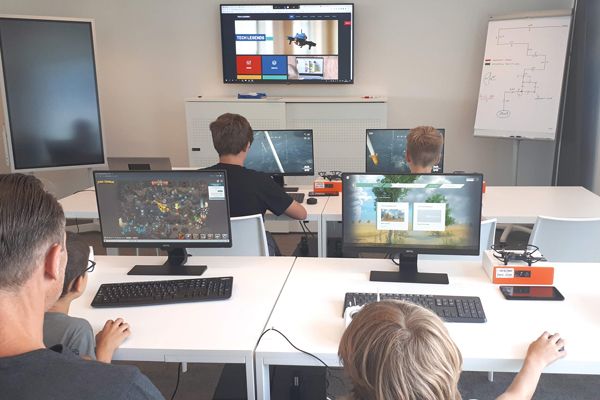
In the wake of an unprecedented lockdown period, the educational system is moving online as far as possible, turning classrooms into online spaces and teachers into virtual educators. Various authorities in their respective domains and realms, at the higher educational institutions or at the school level, have been proposing the setting up of virtual classrooms for e-learning. Here is a detail analysis by Pankaj Samantray of Elets News Network (ENN).
I t’s been unprecedented times across the globe. The novel Coronavirus or Covid-19 has changed how millions around the globe are educated. The spread and the fear of infection, of Coronavirus has shut down almost all educational institutions.
In the wake of an unprecedented lockdown period, the educational system is moving online as far as possible, turning classrooms into online spaces and teachers into virtual educators. Various authorities in their respective domains and realms, at the higher educational institutions or at the school level, have been proposing the setting up of virtual classrooms for e-learning. The institutions are gearing up for remote learning for students.
The new paradigm shift in education approaches have not only narrowed down equality gaps but also introduced new solutions for education and innovation in the sector. Many schools and universities throughout the country are attempting to provide some form of virtual learning with the help of virtual teachers and virtual platforms available.
Also read: Amidst Covid-19: Responding to the new normal
COVID-19 has forced both K-12 and higher education institutions to close their doors to prevent the spread of the virus. These risk-control decisions have led millions of students into temporary ‘home-schooling’ situations globally. These changes have certainly caused a degree of inconvenience, but they have also prompted new examples of educational innovation. The curriculum tools of online education and the infrastructure to communicate with students remotely are playing a crucial role in connecting students amidst the closures.
With this unexpected pandemic, institutions and schools have taken an online verge. However, the shift to online learning could be challenging for everyone. Though the direct interaction of students & teachers can’t be replaced, still in order to motivate the online classes, teachers are leaving no stone unturned to ensure joy, warmth, and humor teacher-to-student interaction. They are trying to make it more engaging through the implementation of live lecturing, video chatting and messaging with multiple students.
However, the efforts to create a classroom environment simply cannot compete with the real thing. Moreover, the more optimistic side is that everybody is stuck at home, which is allowing us to think about personalized learning fluidly In fact, due to online classes conducted through different platforms, all the students are now in the front allowing teachers to be even more attentive towards the needs of the students. It has also made students explore more learning platforms and execute ideas that they have never tried before.
In fact, the lockdown situation would have proven to be very boring had there been no E-learning for these young minds. The virtual platforms have enabled teachers to at the very least start the syllabus & cover the course structure so that students learning don’t suffer. The online classroom platform has maintained the regularity of the learning schedule among students. The teachers are steadily working to adapt and make learning fun, effective and imperative through virtual classes. Also, there is nothing like face to face interactions, and engagement through sharing life’s lessons and creative ideas, brainstorming sessions, coupled with funny anecdotes inside the classroom.
The steps which schools can take to make studies of students will not suffer in the crisis:
Introducing online classes:
Schools can introduce online modules and classes for important subjects like Maths and Science. This will enable students to learn and relearn the basic equation.
Providing online as well as offline notes:
To ensure proper learning, the schools must sharing study plans and notes to the children of each class both offline and online. Students can utilise their time at home, learn and practice as per the progress in the notes.
Rearrange academic holidays to adjust school curriculum:
Once the school re-opens, the schools will have to plan to cut out on holidays through the academic year and adjust for the lost school classes. By reducing the length of summer vacation and adjusting it with classes will spare some time for students and they’ll get enough time to prepare.
Extra classes to make for the lost class time:
As and when the schools reopen, they’ll create a period subject wise timeline for each subject, so that they can provide extra classes to students and ensure that the syllabus is completed.
Assigning class mentors:
The schools must align mentors who will personally speak with the students and their parents and advise them on what to study and how to initiate preparing for the initial chapters seating at home.
Quarantine activities for learning and fun:
While the students are at home, the teachers can assign students activities that will engage them at home. This activity based learning can become a part of the curriculum and will help students cover a few topics even without coming to school.
Cancel the internal exams:
Schools may choose to cover more classes and focus on covering the curriculum and to achieve the same, they may reduce the number of internal or external exams.
We have three challenges- When do we start, who do we bring in and safety measures. Teaching aspect is not worrying but transaction can be an issue. Parents are not in a hurry to send their children back to schools. It’s a great opportunity for teachers to use technology says, Surabhi Goel, CEO, Aditya Birla Education Academy, Aditya Birla World Academy, Mumbai.
We have started new lesson plan. Training teachers and grooming parents and students to take online classes is also important. Safety and health, human touch, and communication is the need of the hour. Preparing logistics will also be important. Staggered classes and times are working on. Teachers are coming up with new ideas to keep students busy. We need to plan out everything before moving forward says, Pratima Sinha, CEO, DSR Educational Society.
Are we analyzing the outcomes of content which is provided to students. We are waiting for new norms from govt in the education sector to revive. Our focus must be, how can we engage the children and teach meaningful stuff. We need to provide application learning to kids says Kavitha Jain, CEO, MDN Edify Education, Hyderabad.
One of the biggest challenge is to provide online education in rural India. There will be apprehensions in the mind of parents over safety, when the schools will be reopened. We are facing a financial crisis as these are challenging times for all of us. Schools in USA and Canada are getting closed. Even, Canada is looking for alternative way of teaching says, Skand Bali, Principal, The Hyderabad Public School, Begumpet, Hyderabad.
There are two major challenges firstly, how to keep the students occupied and secondly, how to keep our teachers keep motivated in this crisis as we don’t know when this will end. It will be huge challenge for new schools also says, Shilpa Potnis, President, Birla Open Minds Group of Schools.
The crisis is here to stay as there is no vaccine for the virus. Lockdown will be the new normal for students. We should cut down on academics and try to develop life skills within a child. We must invest in the non-academic syllabus for students. Students must ready to cope with the new world post-COVID says, Sandeep Goenka, Founder Trustee, C.P. Goenka International School & Yogesh Patel – SVIS Kandivali, Mumbai.
We were not ready for such crisis. Preschools were not ready to deal with online education and teachers were not ready to take online classes. We must start engaging sessions for kids. The villages are getting ready to accept online education. The engagement is important for children not the content says, Pritam Kumar Agrawal, Founder & Director, Hello Kids.
In classroom it just teachers and students, but in virtual classes parents are part of it. We can provide K-studies to our children. For small children, we have storytelling sessions. The parent are connected with teachers in very way as all the assessments, home tasks, report cards are shared with them. It’s a two-way road for both parents and teachers, says Dr. Monalisa Bal, Chairperson, KiiT International School.
There are three phases of education Teaching, learning and assessments. Let the children learn what they have never learnt in this lockdown. Parents are always the first teachers and teachers are second. Now, it’s time we can change our roles. With lockdown, the child is missing connect as he feels lonely at home. We must create an environment for children where he can learn new things. says Dr. Jagpreet Singh, former Headmaster, The Punjab Public School, Nabha.






















